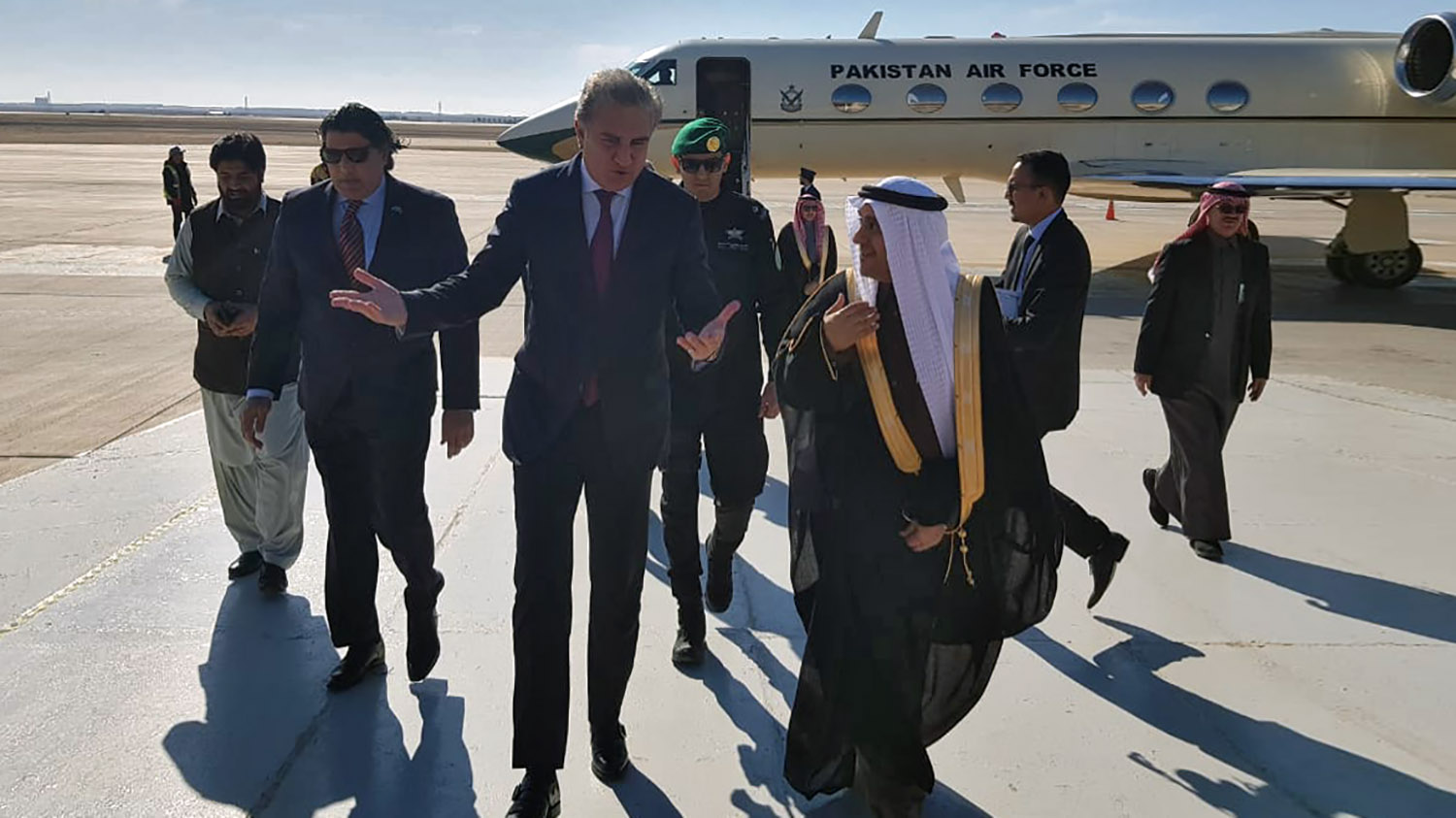ISLAMABAD: Foreign Minister Shah Mahmood Qureshi arrived in Riyadh on Monday as part of his tri-country diplomatic tour in Pakistan’s attempts to defuse tensions in the Middle East.
The minister was welcomed by his Saudi counterpart, Prince Faisal bin Farhan Al-Saud, at the Saudi foreign ministry, according to a statement issued by Pakistan’s Foreign Office (FO) Monday evening.
“During the meeting, views were exchanged over tension in the Middle East and the security situation in the region along with key regional and global issues,” the statement read.
Qureshi expressed concern over mounting tension in the Gulf region and “stressed on peaceful resolution of issues through diplomatic means in order to normalize the situation and ensure regional peace and stability,” the FO said.
“Pakistan’s effort is to convince all sides to exhibit patience and resolve issues through dialogue and diplomacy,” Qureshi said.
He also apprised his Saudi counterpart about with contacts with other foreign ministers in the region and expressed reservation that any conflict could “affect the Afghan peace process, which has entered a critical stage.”
Qureshi said that since both Iran and the United States have made it clear that neither side wants war, it is now imperative to convince all stakeholders to resort to talks.
The Saudi foreign minister appreciated Pakistani Prime Minister Imran Khan’s peace initiative to save the region from crisis and stop the tensions from further escalating.

Pakistan's Foreign Minister Shah Mahmood Qureshi arrives in Riyadh on Jan. 13, 2020. (Supplied)
The PM last week said that he had instructed Qureshi to travel to Iran, Saudi Arabia, and the US to convey Pakistan’s willingness to play a constructive role for peace in the region.
On the first leg of this peace mission, Qureshi met with Iranian President Hassan Rouhani and Iranian FM Javad Zarif in Tehran on Sunday.
During his meeting with the Iranian leadership, Qureshi shared Pakistan’s perspective in detail and emphasized the importance of maximum restraint and immediate steps for de-escalation by all sides, the FO said.
Qureshi reiterated that “Pakistan would not allow its territory to be used against anyone; nor would Pakistan be a part of any war or conflict in the region,” stressing that “Pakistan could only be a partner for peace.”
“Pakistan would also continue to urge constructive engagement among all sides to preserve the peace and advance the prospects of a diplomatic solution,” he said.
Islamabad based Zahid Hussain told Arab News on Monday that Qureshi’s visits to Tehran, Riyadh, and Washington were part of PM Khan’s regional mediation promise made to Trump along the sidelines of the UN General Assembly session in New York.
However, he said that “Pakistan’s role is limited given the complexities of the crisis.”
Senior diplomat Amb. Javed Hafeez said that “we live in a volatile region and Pakistan firmly believes that stability and peace are essential to the general well-being of all people living here.”
“Saudi Arabia is the most important nation on the southern side of Gulf, (and) can play a vital role for peace and stability,” he said, adding that the meeting between the foreign ministers Pakistan and Saudi Arabia is vital in the current situation.
The restive Middle East region found itself on the brink of another conflict in the beginning of January, when the US killed top Iranian military commander Maj. Gen. Qassem Soleimani in an attack authorized by US President Donald Trump.
Soleimani was a high-profile figure in his country and was thought to be the man behind Tehran’s military influence in the region. He was killed in a drone strike in Baghdad, only a few days after the American embassy in Iraq was targeted by pro-Iranian militiamen.
Qureshi is scheduled to fly to the US on Jan. 16.



















